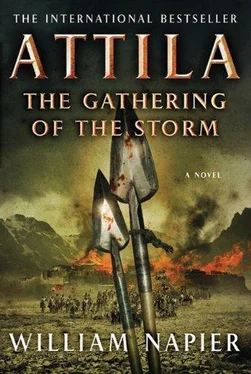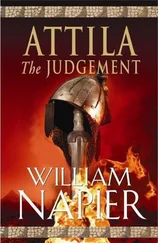William Napier - The Gathering of the Storm
Здесь есть возможность читать онлайн «William Napier - The Gathering of the Storm» весь текст электронной книги совершенно бесплатно (целиком полную версию без сокращений). В некоторых случаях можно слушать аудио, скачать через торрент в формате fb2 и присутствует краткое содержание. Жанр: Исторические приключения, на английском языке. Описание произведения, (предисловие) а так же отзывы посетителей доступны на портале библиотеки ЛибКат.
- Название:The Gathering of the Storm
- Автор:
- Жанр:
- Год:неизвестен
- ISBN:нет данных
- Рейтинг книги:3 / 5. Голосов: 1
-
Избранное:Добавить в избранное
- Отзывы:
-
Ваша оценка:
- 60
- 1
- 2
- 3
- 4
- 5
The Gathering of the Storm: краткое содержание, описание и аннотация
Предлагаем к чтению аннотацию, описание, краткое содержание или предисловие (зависит от того, что написал сам автор книги «The Gathering of the Storm»). Если вы не нашли необходимую информацию о книге — напишите в комментариях, мы постараемся отыскать её.
The Gathering of the Storm — читать онлайн бесплатно полную книгу (весь текст) целиком
Ниже представлен текст книги, разбитый по страницам. Система сохранения места последней прочитанной страницы, позволяет с удобством читать онлайн бесплатно книгу «The Gathering of the Storm», без необходимости каждый раз заново искать на чём Вы остановились. Поставьте закладку, и сможете в любой момент перейти на страницу, на которой закончили чтение.
Интервал:
Закладка:
‘I shall have the finest royal palace from here to Lake Baikal,’ said Attila. ‘Built of carved and polished wood, with many rooms for many wives and servants. As for my own throne, let it be of plain and sober build.’
‘Wood?’ repeated Geukchu.
‘Wood.’
‘My lord,’ said Geukchu, ‘the nearest woodlands to our beloved grasslands are a good two days’ ride to the north, and the people of the woods are not our brothers.’
‘Then take your bows and your swords, and the best wagons for transport. I am leading a raiding party east. We will be no more than a week. The palace will be built upon my return.’
He pulled his horse round and rode away.
‘A raiding party?’ said Orestes, running after him.
Attila glanced back and growled with irritation, ‘Get on a horse, man.’ Then he nodded. ‘Eastwards, to the Byzantine trading-station at the mouth of the Tanais.’
‘But… it isn’t the season for furs.’
‘Furs?’ he said mockingly. ‘It’s not furs we need. It’s Greeks.’
Minutes later the king rode out of the camp and eastwards into the lawless steppelands with just four men for company: faithful Orestes, young Yesukai, the handsome Aladar, and Csaba, the skinny, far-eyed dreamer. Old Chanat sulked like a boy at not being chosen.
Many thought that he must be crazy to ride off with so little escort and bodyguard, two or three days to the east and into the lands of unknown tribes and nomad bands, now guarding fiercely what pitiful pastures remained at the parched and hungry end of summer. But none dared say it.
They rode well armed, but with supplies for only a day.
The Hun warriors’ fingertips were raw with having pulled the bowstring for gruelling hours and days of target practice, under the watchful eye of Orestes, both at standstill and at full gallop; and the soft insides of their left arms were likewise grazed red-raw. But now Attila allowed them to wear leather guards on their left arms, and leather fingerloops, and they fired better each day. The muscles in their arms and chests ached but hardened under the repeated strain of that bowstring and that springing, lethal bow.
They rode south and east until they met the shores of the Maeotis Palus, which is to say the Marsh of the Scythians, which in the barbarian tongue is called the Sea of Azov. It is a haunted place.
The waters were low after the long, hot summer. As they rode in the brackish shallows to cool their horses, they set off flocks of the little dun sandpipers that gathered along the fertile mudflats, gorging on tiny shellfish before their autumn flight far eastwards over the Sea of Ravens and so on to the sunlit lands of India for winter, when all of Scythia would be in the grip of the devils of ice and frost.
‘So,’ said Orestes at his master’s side. ‘Greeks.’
Attila said nothing for a long while. Then looking ahead still he said, ‘It is not only swords and spears that give us power over the world. It is also facts. So much of what men have invented is but to hide from the facts. Religion is a coverlet to muffle the spiky facts. But the facts of the world were made by God, religion was made by men.’
‘And the truth?’
‘Aha,’ said Attila, turning to Orestes, his eyes dancing. ‘The truth. The truth is far otherwise than what men in their dreams and coverlets imagine.’
They rode on.
‘Here is a fact,’ said Orestes after a while. ‘Your brother Bleda is already plotting against you.’
‘Of course he is,’ said Attila evenly. ‘Do you think I am a fool?’
‘Heaven forfend, Great Tanjou,’ said Orestes with exaggerated obsequiousness.
Attila looked at him askance. ‘Forgo the flattery. That’s Geukchu’s domain.’
Orestes smiled. ‘But did you know that Bleda has already sent a messenger with a letter to Constantinople?’
He enjoyed a brief moment of satisfaction. Attila, for once, was taken by surprise.
‘My brother… a letter…?’
‘To request their help, and their gold, in regaining what is rightfully his, as the elder brother and lawful King of the Huns.’
‘My brother!’ cried Attila again, and this time he seemed nothing but delighted. He even dropped his reins and clapped his hands with glee. ‘He couldn’t plot an overthrow in a marmot burrow!’ He laughed, he roared. ‘Oh, my stupid brother, how you shall entertain us with your plans and plottings!’ He actually wiped a tear from his eye with the back of his hand. How good it would be to monitor this unfolding conspiracy. How pleasurable to spy on his brother’s manoeuvrings, as clumsy as a camel’s in a bazaar. How sweet to savour such knowledge and power. To wait and finally to pounce upon that slow-brained fool, and dismember him for his impertinence and folly.
‘Keep me informed,’ he said, his laughter at last subsiding. ‘Please.’
‘Should we not send out to kill the messenger?’
‘No,’ said Attila. ‘Not at all. It’s a fine way for the empire to hear of my return.’
‘The empire?’ said Orestes, quietly and wonderingly, as if he had almost forgotten that word in his thirty years’ of wandering.
‘The empire,’ repeated Attila. As if he had not forgotten the word or the thing behind it. Not one whit. ‘Rome.’
They rode hard all day and into dusk, setting camp after dark some miles inland from the mosquitoes and fever of the Marsh. They chewed salt beef and drank weak koumiss and slept on the ground under their horse blankets. Each of them awakened in the dull hours before dawn to roll tighter into his coverings, the damp arising now from the dark earth beneath them to chill their bones with the whispered assurance of the shivering winter to come.
In the pewter dawnlight he had them already roused and mounted and practising their bowshots at stand and at full gallop.
They rode eastwards all that second day in silence. Formed up like a skein of wild geese behind their enigmatic king, seen by the eagles far above their bowed heads as a tiny black v moving slowly over the infinite plain.
Far off they saw the dustcloud of a saiga herd, and a buzzard planed low towards them, swept over their heads near enough for them to see its unblinking amber eyes, and then glided on. They flushed a startled hoopoe from the long feathergrass at their horses’ feet, and on a low, close-cropped rise to their left they saw a marmot sitting up on its back legs regarding them, but it vanished into the ground before they could nock an arrow to the bow. They each cursed inwardly at the thought of even a few mouthfuls of its dark, oily meat. They saw no other game. On the third day they came through dry thornbrakes to a brackish inlet of the Marsh, half hidden by sallow and broken alder, and they tethered their horses and waited.
Three nights from home, far out on the great plain. Waiting there by the sluggish, midge-specked water of the inlet for the herds, to come out like knives to hack at vulnerable hocks. But no luck. Not a chance. Shadows of birds. No herd came. And this the third night yet. Out of the night’s cliff they hollowed a little cave of firelight. The wind as if in winter had blurred their eyesight. Their eyes like ice deflected the warmth of the fire. Their hearts yawed and flickered feebly like the flames in the downdraft from the shallow swale above, when they saw that their king was gone, alone on the plain. He stood with his head thrown back, his arms outstretched, murmuring words under the moon. Then he was gone altogether. The night was still, the wind dropped. The stars burned. All the world was still. Their heads were heavy, their brains hummed a song of ash. When a trembling deer stepped into the firelight, which they took and killed for God’s and their bellies’ sake.
They rode through long dry grass as pale as hay all the next day. Towards evening they reached low hills of bitterspar and came up through a shallow valley and crested a green rise, and there in the dusk they could see the distant torchlights of the Greek trading-station of Tanais. Low wooden houses, landing-stages, long logwood wharves, and the great river itself, stretching away limitless in the gloom. A dusty road followed the course of the river northwards, and men walked it or rode small ponies and rackety wagons.
Читать дальшеИнтервал:
Закладка:
Похожие книги на «The Gathering of the Storm»
Представляем Вашему вниманию похожие книги на «The Gathering of the Storm» списком для выбора. Мы отобрали схожую по названию и смыслу литературу в надежде предоставить читателям больше вариантов отыскать новые, интересные, ещё непрочитанные произведения.
Обсуждение, отзывы о книге «The Gathering of the Storm» и просто собственные мнения читателей. Оставьте ваши комментарии, напишите, что Вы думаете о произведении, его смысле или главных героях. Укажите что конкретно понравилось, а что нет, и почему Вы так считаете.












